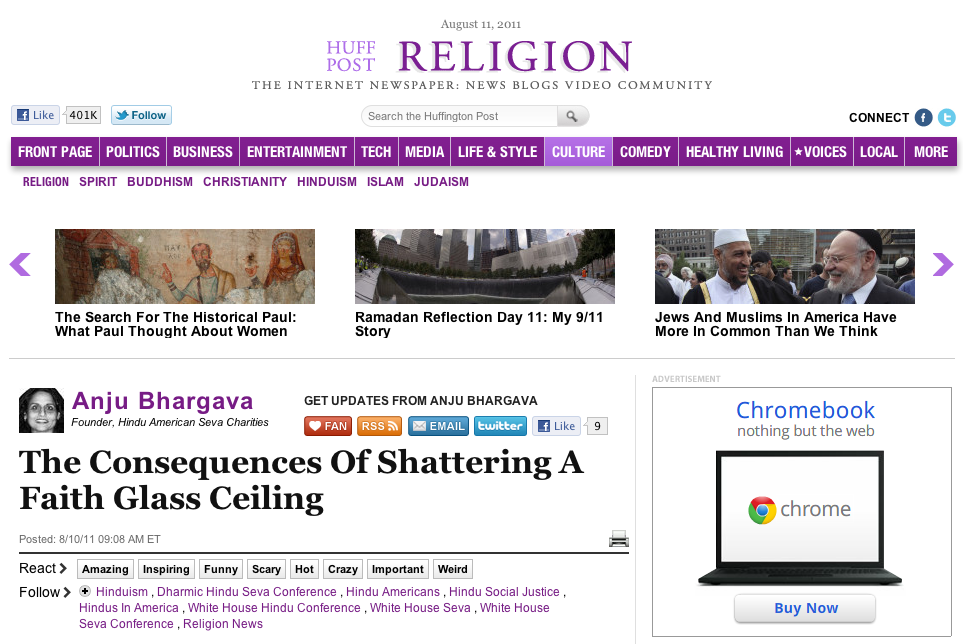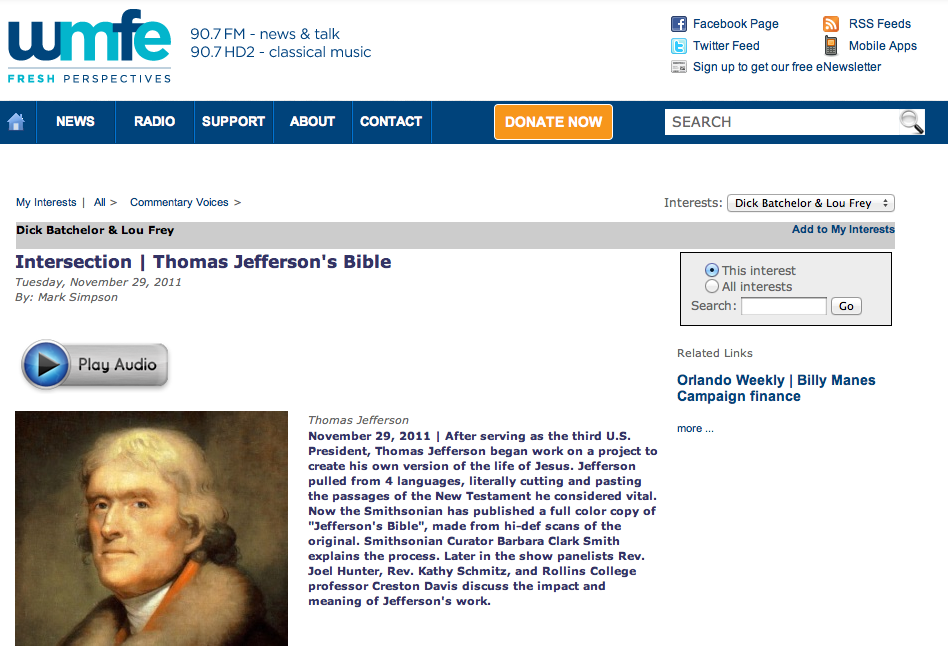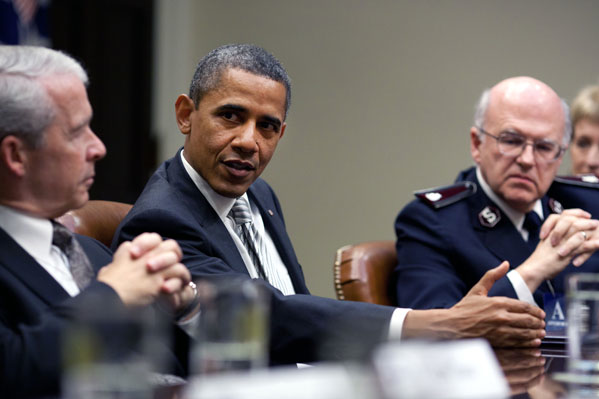 The economic situation in the country is affecting us all; and those affected the most are hit hardest. "Around 14 million people in the U.S. are jobless today. Yet, several states -- even some that are experiencing economic recoveries -- have begun to cut jobless benefits, according to recent data obtained by 24/7 Wall St. (Read more: "9 States Slashing Unemployment Benefits")
The economic situation in the country is affecting us all; and those affected the most are hit hardest. "Around 14 million people in the U.S. are jobless today. Yet, several states -- even some that are experiencing economic recoveries -- have begun to cut jobless benefits, according to recent data obtained by 24/7 Wall St. (Read more: "9 States Slashing Unemployment Benefits")
As a Hindu American when I read this, the question that comes to my mind is: So what is the Hindu American community doing about it? Having just co-hosted the first Dharmic Hindu Seva Conference at the White House, I see some of us are acting proactively. As Dr. Martin Luther King Jr. said, "What affects one, affects all".
While the debt ceiling was being debated, Hindu American Seva Charities participants were discussing how they can strengthen the country. The historic event, "Energizing Dharmic Seva: Impacting Change in America and Abroad" shattered another glass ceiling -- one of acceptance of faith in an American context.
The shattering of the glass is echoing around the world. We hope not only the ceiling but many windows and doors will open wide. The sounds, the voices of our homegrown Hindu-Americans, needs to be exponentially amplified at home and abroad. We hope those who witnessed history in the making July 29-31 will work to make the inclusion a reality.
Recognizing the importance of inclusion of Americans of all faiths, President Obama's message to Dharmic Hindu Americans was to work together to strengthen our communities and promote Interfaith Community Service. This was reemphasized by Senator Wofford who shared his journey of bringing the Gandhian thought to America, by Secretary Shaun Donovan who emphasized the global interconnectedness in community development and the many others who emphasized collaboration in service.
Jasmeet Sidhu, as essay participant and author of "Do Faith-based Groups Have a Place in 21st Century America?" aptly captured some of our sentiments: "...at the conference I heard different religious groups speak of using religion and religious networks to tackle nutrition and healthy eating, climate change, women's equality and empowerment, and to promote cultural understanding and harmony between different diverse groups. Hearing these ideas on the same weekend where the debt crisis was being fought just down the road at Capitol Hill with the looming reality of spending cuts and decreased support for social programs, it seemed more pertinent than ever to me that these religious groups become more empowered to step into the public space where the government can no longer."
What this means is that the Dharmic and Hindu American communities needs to take the responsibility and share in developing creative seva ideas that will strengthen the country... We need to expand our Conference theme: Impacting Change in America and Abroad. There are so many ways in which we can take the best of our traditions and culture to help the country. The essays give an insight into the ways the next generation is thinking of finding seva solutions rooted in their Dharmic faith and seva tradition. (These will be posted on our website shortly).
Seva is an integral part of our sadhana, our perennial spiritual practice. We are taught to do selfless service. Krishna in Bhagvad Gita teaches Daata vyamiti Yaddanam Deeyatenupa Karine Deshe Kale cha Patrecha Taddanam Sattvikam Smarutam. Service which is given without consideration of anything in return, at the right place and time to one that is qualified, with the feeling that it is one's duty, is regarded as the nature of goodness.
So our tradition says when we give we need to align and attune all to that we are and have -- tan, man, dhan (mind, body, soul) and resources -- to the task at hand: to serve. And, at the same time, to free our inner being from getting attached to the results and the outcome. The welcome note from the President showed that he understood we are people of selfless service. Yes, we have much to give to this country. And we should, especially in this time of need. It is through this process that we ourselves become an integral part of the fabric of the pluralistic America, core teachings that our own Vedic Hindu traditions are rooted in.
It is only by coming together that we can advance the Dharmic Hindu and American values of selflessness and service. The President's Interfaith Challenge on Campus provides us all an opportunity to practice the selfless seva principles and foster the development of seva centers
I hope all Americans will support seva center development. We are urging the people of Dharmic traditions to develop them on college campuses, in temples and in cities, towns and rural areas, to reach out to serve all and to be in service of our country. These diasporic interfaith relationships, such as our partnership with St. Benedict's Prep School, can augment building global leaders of tomorrow.
It is through this interfaith collaboration that Hindu Americans, especially the young, will feel comfortable in their own country. Rema Venkatasubban, HASC's AmeriCorp VISTA recounted at the White House:
The tragic events of 9/11 was a turning point in our lives. I saw first-hand Hindu youth being taunted with questions like, "Are you related to Osama Bin Laden?" or "What race are you and why do you have monkey and elephant headed Gods?" At an impressionable age, many Hindu American youth were told by their peers that "if they believe in Jesus, they will go to Heaven, otherwise they will go to only 711, the corner store." Many were told to go back to where they came from."
And, in his recent HuffPost Blog, Phil Goldberg vividly captures the sentiments of our youth:
"Some of the youth at the HASC conference told disheartening stories of ostracism, harassment and crude attempts at conversion by Christian classmates. This is as disturbing as it is difficult for teenagers to handle, and one hopes that corrective measures will be taken. At the same time, this too shall pass. After all, not that long ago many Americans thought Jews had horns and drank the blood of Christian babies on Passover. If Hindu youngsters avail themselves of their tradition's own treasures, they will be able to respect the proselytizers' religious convictions while at the same time cultivating inner peace and the capacity for skillful action through yogic practices. Over time, I'd predict that the ostracizers and would-be converters are more likely to be influenced by their Hindu counterparts than vice versa."
Eric Shafer expressed similar sentiments. As did Joel Hunter, Pastor at Northland Church in Florida, Rabbi David Saperstein, Religious Action Center of Reform Judaism, and Dalia Mogahed, Gallup Center for Muslim Studies.
Beyond the conference, we need to continue to energize seva and bring visibility to the many ways we can make a change. We need to be Dharmic solution providers. We already have through yoga, ayurveda, et al, which, though rooted in Vedic and Hindu traditions, are universal and are helping humanity. HASC is an official partner of the President's YOGAPALA Challenge program for the President's Council on Physical, Fitness, Sports and Nutrition and is urging all Americans to make yoga count at the national level by enrolling in the Challenge.
At the core, Sanatana Dharma, the ancient Vedic tradition we Hindus follow is a universal way of life, leading one to inner transformation. All the tools and techniques that we have are meant to help an individual lead life with an inside out approach. The many aspects of yoga, our way of worship, our traditional way of life are meant to train and strengthen an individual internally as they performed their duties of existence in the outside world. Now we need to expand our seva infrastructure capacity, interfaith seva collaboration, to serve the country and build cultural bridges.
As I see it, in the end, the people of the Dharmic and Hindu traditions, those inspired by Vedic philosophy, by Yogic principles, by eastern traditions to come forward, come together and help the country as it finds a way to deal with the many crisis. As new Americans, the community needs to enhance its ability to harness the resources to benefit humankind and help the nation. Of course, this can only become a reality with the support of the people of all faiths.
And we need to hear these stories of seva to keep the movement going. We need more voice who are making a difference -- especially of those applying eastern traditions and principles of Dharma -- to be heard.
 A decade after Thomas Jefferson left office, the nation's third President started working on a project compiling the four gospels of the Bible's New Testament into a book that removed supernatural parts Jesus' life. It came to be known as "The Jefferson Bible." The work was recently published by the Smithsonian Institution. NPR affiliate WMFE invited a panel of religious leaders and scholars to discuss the meaning and impact of Jefferson's biblical revisions. Here, Pastor Joel Hunter talks about what happens to Christianity if miracles like the Virgin Birth and the Resurrection are removed from the faith. CLICK TO LISTEN.
A decade after Thomas Jefferson left office, the nation's third President started working on a project compiling the four gospels of the Bible's New Testament into a book that removed supernatural parts Jesus' life. It came to be known as "The Jefferson Bible." The work was recently published by the Smithsonian Institution. NPR affiliate WMFE invited a panel of religious leaders and scholars to discuss the meaning and impact of Jefferson's biblical revisions. Here, Pastor Joel Hunter talks about what happens to Christianity if miracles like the Virgin Birth and the Resurrection are removed from the faith. CLICK TO LISTEN.





